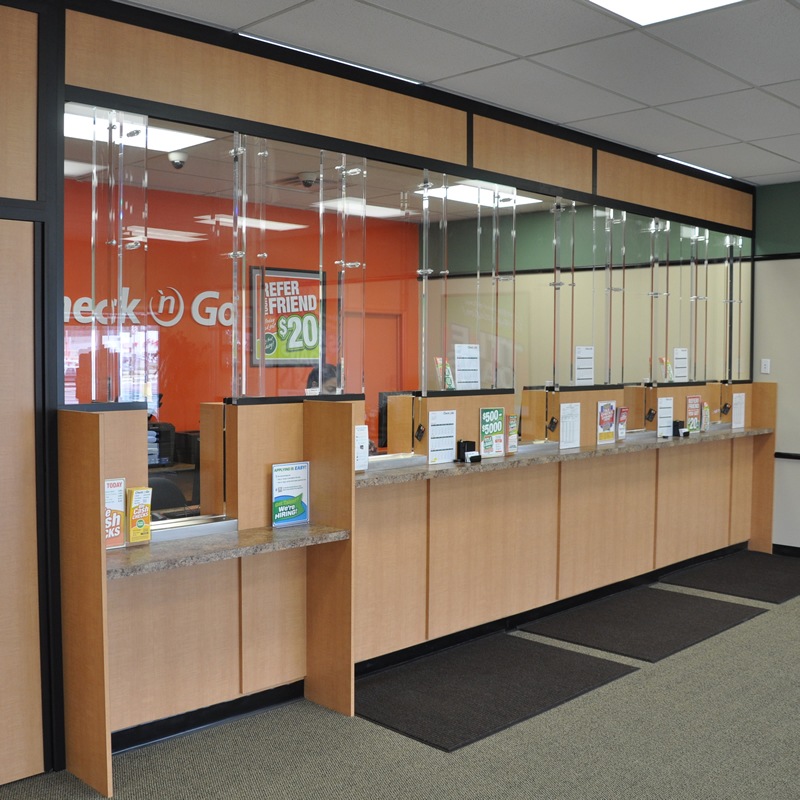WHAT IS BULLETPROOF GLASS?

Bulletproof glass is made up of plastics or a combination of plastic and glass designed to resist penetration by bullets and other projectiles. These types of glazing materials are commonly used in areas where there is a need for heightened security, such as in military and government facilities, banks, and schools.
THE FOUR TYPES OF BULLETPROOF GLASS
Our line of bulletproof and ballistic glass products are available in a wide variety of glazing makeups meeting various levels of ballistic protection for use in an unlimited number of security applications. From interior to exterior applications, low level to the highest level of ballistic protection or enclosures to framed windows and doors, Insulgard’s bullet-resistant glazing products can offer the solution you’re looking for.
ACRYLIC GLAZING
Bullet resistant acrylic glazing is a durable monolithic plastic typically 1 ¼” to 1 ⅜” thick with high impact resistance. It can absorb and disperse the shock of lower level ballistic threats (UL752 levels 1-3) preventing both penetration of the bullet and spall to the interior/safe side.
Our acrylic glazing products are readily available in standard sheet sizes for fast turnaround. Acrylic bulletproof glass is available in UL levels 1, 2, and 3.
LAMINATED POLYCARBONATE GLAZING
Bullet-resistant laminated polycarbonate sheets are both a secure and lightweight option, ideal for interior applications. Laminated polycarbonate glazing offers high clarity and is able to fit different shapes and sizes.
Our laminated polycarbonate products range from UL level 1 to 3.
GLASS-CLAD POLYCARBONATE GLAZING
The strongest type of bullet-resistant material is glass-clad polycarbonate, constructed from several layers of polycarbonate and glass that are bonded together. Because of the presence of glass on the exterior surface, these products can be insulated with specialty Low E coatings resulting in much improved thermal properties. Glass-clad polycarbonate glazing also offers sound insulation for maximal security.
Our glass-clad polycarbonate products are available up to a UL level 8.
ALL GLASS LAMINATE GLAZING
All-glass laminate glazing products offer prime optical clarity and ease of maintenance, in addition to thermal and acoustic insulation. They can be used for interior and exterior applications and are especially performant in outdoor conditions because of their weather and UV resistance.
Our all-glass laminate glazing products range from UL level 1, 2, and 3.
THE ADVANTAGES OF BULLETPROOF GLASS
- Increased Safety: The primary function of ballistic glass is to mediate bullets. This is an integral security feature in high-risk settings such as banks, government buildings, and schools. Bullet-resistant glazing is also tough enough to resist forced entry attempts as well as provide protection during natural disasters that can cause debris or shattered glass.
- Protection Against Ballistic Threats: Insulgard’s bullet-resistant glazing materials are designed to withstand multiple bullet impacts. In a scenario where multiple rounds might be fired, our glass will continue to perform even after the first shots are fired. When bullets impact traditional glass, it can shatter and pose additional safety risks. Our bullet-resistant glazing is designed to absorb shock and contain debris even when shattered.
- Retention of Structural Integrity: Standard glass can shatter and collapse upon penetration, while bullet-resistant glass will stay in its frame even when impacted. This feature prevents openings that could allow attackers to enter. Bullet-resistant materials are also designed to withstand extreme environmental conditions such as wind and debris from tornadoes or hurricanes, increasing structural security.
COMMON APPLICATIONS FOR BULLETPROOF GLASS
- Financial Institutions: Bullet-resistant glazing is commonly used in banks and other financial institutions where there is a high risk of armed robbery. It protects employees and customers by providing a penetration barrier for teller windows and entrances.
- Government Buildings: In government facilities, such as courthouses, embassies, and municipal buildings, bullet-resistant glazing is a main security feature protecting government officials, employees, and civilians against potential threats. Bullet-resistant infrastructure helps maintain the continuity of government operations by preventing disruptive and dangerous activities.
- Schools and Universities: With educational institutions facing increased security risks, bullet-resistant glazing has become an effective tool for promoting campus safety. It serves as a proactive measure to protect students and faculty from potential violent incidents and is especially beneficial when used in entrance areas and ground floor windows.
FREQUENTLY ASKED QUESTIONS
How does bulletproof glass differ from regular glass?
Bulletproof glass is constructed from layers of glass and plastic, such as polycarbonate. When laminated together, these materials absorb and dissipate the energy of ballistic impacts. Regular glass, on the other hand, shatters easily under stress and doesn’t provide protection against ballistic penetration.
What are the main applications of ballistic glass?
Ballistic glass is commonly used in areas where there is a heightened security risk, such as military and government facilities, banks, schools, corporations, convenience stores, and ticket counters to protect employees and civilians.
How effective is bullet-resistant glass in protecting against various ballistic threats?
Bullet-resistant glass is highly effective in stopping or slowing bullets from a variety of firearms. The effectiveness varies according to the glazing’s rating, determined by standards like UL 752 or NIJ levels. This rating system matches the material with specific types of ammunition and firearm calibers it can withstand. If you’re wondering which material is appropriate for your security needs, contact us and we will be happy to advise you on the appropriate materials.
Can bulletproof glass be customized to fit specific security needs?
Insulgard’s bulletproof glass can be extensively customized to meet specifications. Our materials can be manufactured in various thicknesses, compositions, and sizes, accommodating the specific type of ballistic protection required by the facility. If you are looking for custom security solutions, please reach out to request a quote tailored to your configuration needs.


